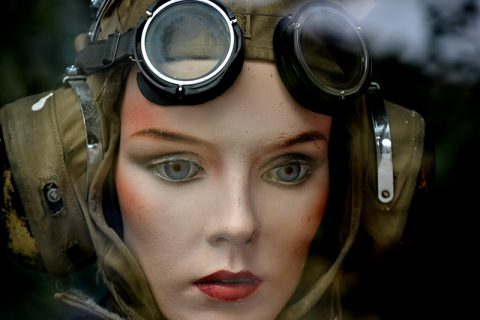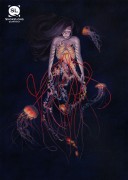So much of flash fiction is what we leave out as writers. I noticed you didn’t name your protagonist. Why? What is that blank space about?
I named her and then changed her name several times but none of them worked. I didn’t see it or feel it, and with all my work, I like to really feel like that’s the character’s name, for real. I have to be able to see her face when I say it out loud. I felt like maybe she didn’t want to be named, and when I sat with that for a spell, it felt right. There’s so much complexity to her and the inability to name her just reinforced that for me.
It sounds like you’re an intuitive writer; what about the story were you conscious of? That is, what were you certain of as you wrote it? What did you know had to be in the story, and why?
I love this question.
I wrote the first draft at a PEN workshop at the Bronx Museum of the Arts last spring: Writing Fiction from Memories, with Chantel Acevedo. She took us through various exercises where we ended up with a list of memory triggering objects and places. On my list was the plum tree in my backyard, the dollhead and the junkyard next door. Then I put my head down and just started writing, yes, intuitively. The first draft was strong. I had a solid structure; the skeleton of the story was there. I went through a few versions of it before I was finally ready to submit. That process was more about adding and cutting some details. I’m a huge sensory writer so I had to decide which details moved the story forward and which were overkill. Ultimately that’s the deciding favor–do I need this for the story to be cohesive or can I chop it?
Who is your audience?
I call them Loba Pack, they are people I can be my most authentic self with. Some of them are writers, some are not, but with them I can be all of myself, Afro Indígena, Boricua Hondureña from Bushwick, Brooklyn when it was a pile of rubble. When I write, I imagine we are in my kitchen after eating a meal I cooked for us, we are sipping bourbon and I am telling them stories. I can slip in and out of Spanish and dialect. Some of them don’t know Spanish so if I feel they won’t get what I’m saying, only then will I translate or give them clear context clues so nothing is lost.
Speaking of audience–what/who are you reading right now?
I confess that I’m obsessive so for a minute I was only reading memoirs and essays. I wanted to learn everything I could possibly know about autobiographical writing. I recently moved out of that to inhale some fiction I’ve been wanting to read. I just finished Roxane Gay’s An Untamed State. I’ve loved her essays for some time now but had yet to read her fiction, and am glad I did. She’s an incredibly dexterous writer who isn’t afraid to take risks, especially in subject matter. I have mad respect for that. I’m now digging into Dorothy Allison’s Bastard Out of Carolina. I also love her essays (especially her Tin House essay “Place”) and wanted to read her fiction. I guess I’m trying to see how other people have done it, that is, navigate moving between genres. I have written two novels (one published) and abandoned it a few years ago when memoir took over, but it’s whispering me back home. Writing “Dollhead” shook something loose. Let’s see what happens.
Why does fiction, or flash fiction, matter to you? To everyone?
I had a hard time answering this question because I didn’t know where to start. As a writer, fiction has allowed me to create stories out of the world I know and those that only exist in my head, and to confront questions that roil around in my insides. As a voracious reader, I’ve learned so much about humanity in fiction. In the process of reading fiction, I’ve been able to see the world through someone else’s eyes and mind, and have had my deepest held beliefs both confirmed and challenged. Fiction has required that I step outside myself and the things I thought were certain. Fiction has challenged me to understand the world and myself in new ways by giving me a glimpse into someone else’s life. I think that’s necessary to becoming a whole, compassionate human being.
Literature provides us with a geography of the unanswered questions (aka mysteries) humanity has been asking for centuries. Questions like: Why do people hate? Why do we fall in love with that one person? How do damaged people fix themselves? What is death? And the list goes on and on. Fiction delves into the inner lives of humans, how we are shaped by our circumstances, heartbreaks and successes. Fiction reminds me that the inner life of the mind still matters, emotions matter and the unconscious matters and these mysteries are real, and we aren’t alone in asking them.
The great gift of fiction is that stories provide us with intricate canvases of human stuff (in how these authors answer the questions and confront the mysteries around death and love and life and our place in it) so that we as the readers can figure out our own sense of meaning. And don’t we all need help with that?



 The core workshop of SmokeLong Fitness is all in writing, so you can take part from anywhere at anytime. We are excited about creating a supportive, consistent and structured environment for flash writers to work on their craft in a community. We are thrilled and proud to say that our workshop participants have won, placed, or been listed in every major flash competition. Community works.
The core workshop of SmokeLong Fitness is all in writing, so you can take part from anywhere at anytime. We are excited about creating a supportive, consistent and structured environment for flash writers to work on their craft in a community. We are thrilled and proud to say that our workshop participants have won, placed, or been listed in every major flash competition. Community works.